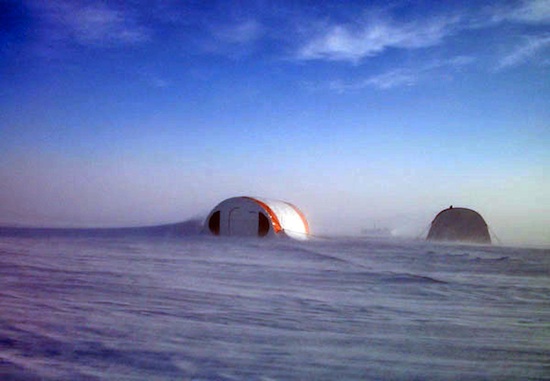It isn’t a question of who’s following whom. The critical question is, what is the evidence saying? [22 May 2012 | Peter Boyer]

Law Dome’s unusually high rate of snow accumulation makes its ice cores especially valuable in understanding changes to climate over recent centuries. PHOTO VIN MORGAN, ACE-CRC
“I believe in climate change” is one of the silliest lines to emerge from the interminable debates about climate — perhaps as silly as “God will fix everything no matter what we do”.
It’s a line Julia Gillard has used many times. She obviously means that she believes in the truth of what scientists have told her about climate, but it’s a bad choice of words. “Belief” implies faith, with all its religious and ideological baggage.
In a similar vein, I’ve been accused of being a “follower” of Al Gore, who as we know was a leading US Democratic Party politician. As a follower I suppose I’d be carrying a torch for his political beliefs, whatever they are. I’d be partisan, and therefore not to be trusted.
It’s true that in 2006 the Australian Conservation Foundation picked me among other Australians to meet with Gore, hear his climate change slide show first-hand, and learn how he’d reached the conclusions he had. But as usual, the whole story is more complicated.
I can’t speak for the others in my group that year, but this meeting with Gore didn’t tell me a lot I didn’t already know about human-induced global warming. I’d first heard of it nearly 20 years earlier when I was a writer and publicist for the Australian Antarctic Division.
The person who told me about it was a veteran Antarctic scientist who’d been asked to get involved with a new international group, the Intergovernmental Panel on Climate Change, to investigate natural and possible human influences on climate change.
A dour, doubting character, this glaciologist was sceptical of the evidence for a human fingerprint in climate change, and believed that the IPCC would finish up focusing on natural causes. Not being a scientist, I had no reason to doubt him.
Then in the 1990s Australian scientists began to drill down into a big lump of ice on the Antarctic coast called Law Dome, where a high snowfall made for top-quality ice-core data on climates of the recent past. The air bubbles trapped in this ice as it formed from falling snow revealed a human contribution to a rising level of atmospheric carbon dioxide since the early 1800s.
A good scientist must be able to change his or her mind if and when the evidence dictates. As the evidence for a human fingerprint mounted, my glaciologist colleague shifted his position. Watching this happen, I came to appreciate the sheer mental effort involved in making sense of the complex data coming out of his and others’ studies.
I could see that polar scientists’ views about climate were derived not from personal belief, but from what they observed, and I shared their concern that the public become aware of this. I and some colleagues even produced a short video about global warming — more than 10 years before Gore’s An Inconvenient Truth became a box-office hit.
I was glad to be associated with Al Gore in 2006 because his message fitted what the scientists I knew were saying, and I continue to support his work. But whatever my more doubting readers might think, I was not a convert to the Gore “cause”. I had made up my own mind long before.
So how did those people who, like me, expressed support for Gore’s work, or who just spoke out on the need for action on climate, become branded as political partisans or religious evangelists?
What we have been saying about the human contribution to greenhouse warming has been, and remains, firmly based in mainstream climate science, supported by the work of thousands of scientists around the globe.
The level of agreement about human-induced warming among the world’s scientists is as high as for the science around gravity and Earth’s place in the cosmos. I wonder, if I were arguing that gravity is real and Earth is a sphere, would that be construed as a religious belief? Would I be called an evangelist?
Former Labor leader Mark Latham (remember him?) writes the occasional column for the Financial Review. He isn’t my favourite ex-politician, but as an observer of the shifting climate of opinion about global warming he’s remarkably astute. Here’s one of his recent thoughts:
“At face value, society’s small-talk about the weather is frivolous. But in the debate about global warming, it is a highly significant habit. Everyone is an expert on the weather, so why shouldn’t they have a strong opinion on climate, regardless of what the professional researchers say?”
Indeed, you could argue, why shouldn’t any educated, intelligent person be able to determine as well as any scientist what’s going on around them? As Latham concluded, people have learned to be egalitarian. Having shaken off their respect for expert opinion, they’ve formed their own views.
I agree that we should keep our wits about us when presented with “expert” opinion, scientific or otherwise. I welcome readers’ sceptical views about what I write, so long as it’s real scepticism and not a cover for personal prejudice.
As I’m regularly reminded by bloggers who like to point up my shortcomings, I’m not a scientist. My arts education taught me little about the scientific method and its practitioners.
But it did give me some useful tools in discriminating between shallow rhetoric and genuine intellectual achievement. I’ve seen the science at first hand. It’s not pretty, but it works.
